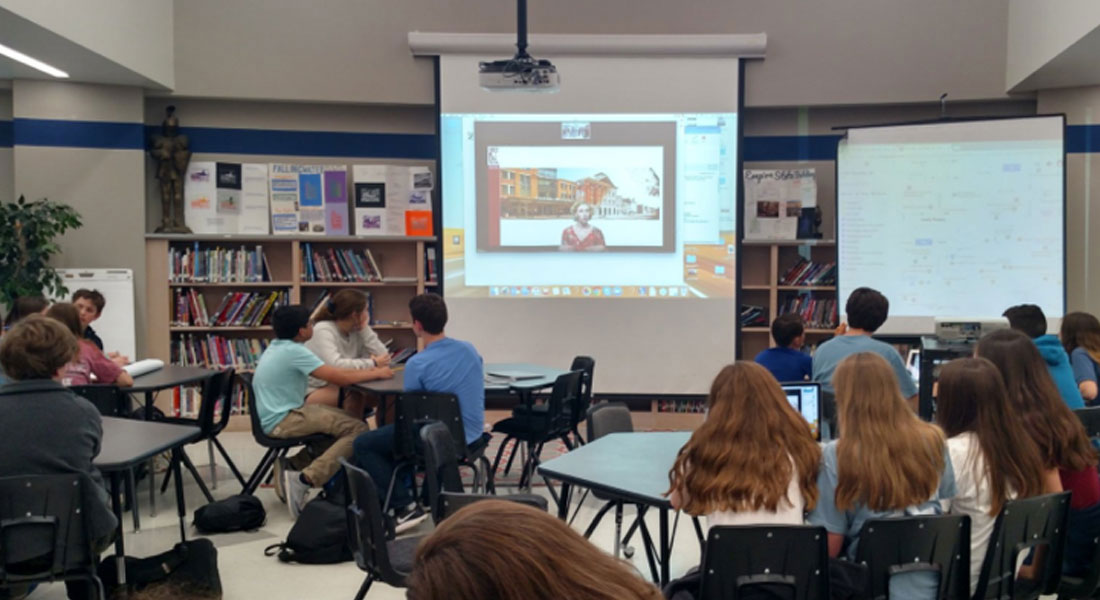
Going Virtual: Students Nationwide Participate in Lincoln Online Oratory Project
For more than eight years, Ford’s Education has worked with students and teachers to provide oratory instruction and public speaking tips and tricks both locally and nationally. We’ve brought whole classrooms to perform on the historic Ford’s stage in our local Lincoln Oratory Festival and worked with teachers across the nation to develop oratory skills in their classrooms through our National Oratory Fellowships.
But we still looked for ways to adapt the experiences for a wider national audience, since many teachers from our summer teacher institutes so often asked if we could. How would that work? We wanted to offer students nationwide the opportunity to study and work with a Ford’s teaching artist and perform a speech by Lincoln. But could we do that without physically going into a classroom and hosting a performance on stage? Could it work virtually?
The answer we settled on was the Lincoln Online Oratory Project, and three years in it is going great!
How LOOP Works

The Lincoln Online Oratory Project (LOOP) uses video-conferencing to bring Ford’s teaching artists into classrooms. Like our local program, teachers (grades 3 to 12) choose a speech by Abraham Lincoln for their students to read closely. A Ford’s teaching artist virtually visits the class via video-conference three times to teach Ford’s Podium Points (the elements of effective public speaking) and work with the class on devising a performance of the speech.
Rather than perform the speech on Ford’s stage, the class stages and records their speech performance. Once the videos are complete they are sent to Ford’s, where they are uploaded to our YouTube page and circulated among staff, colleagues and the community. We love how varied the videos are—all using the historic words of Abraham Lincoln—and adding their own style and twist.
Integrating LOOP into the Classroom
Our goal in each LOOP classroom is to introduce students to Lincoln’s words while teaching them our Podium Points and demonstrating the value of public speaking. But how each participating classroom chooses to integrate LOOP into their curriculum and instruction varies.
Some classrooms use the project as an opportunity to learn more about Lincoln as a leader, while others use the project as an opportunity to connect past to present.
LOOP is a strong fit for both English Language Arts and social studies content, and also is a wonderful opportunity to make cross-curricular connections between traditional content areas and arts specials.
A particularly interesting example of a LOOP video came from a theatre class at Hyattsville Middle School in Maryland during the 2016-2017 school year.
This video is a great example of how performance can help students learn and demonstrate understanding of history content.
Feedback
So far, LOOP has reached nearly every corner of the continental United States, from Texas to New Jersey and beyond! Like us, teachers have been pleased with how the virtual teaching artist visits have gone.
Deji Dugger, a teacher in Oklahoma wrote to tell us, “What a wonderful world we live in where students in Oklahoma are trained by theatre professionals half a continent away using Skype by Ford’s Theatre. This was an interactive learning experience not only for my students, but for myself as an educator.”

Teachers find public speaking has helped with students’ social skills and confidence. Pennsylvania teacher Lucas Rendulic reflects, “LOOP got my students out of their comfort zone. It showed them what it takes to be an effective and powerful speaker. I think this project has also taught them how to be more mindful of what they say and do when they speak in front of a classroom of their peers.”
How do students feel about our teaching artists visiting their classrooms to teach oratory?
California Middle schooler Kailey told her teacher, “I felt like a star while participating in the Lincoln Online Oratory Project. It really helped me progress as a student. I’m more confident talking in public in front of a large audience.”
A student in Georgia commented, “I really liked using art and technology with history,” while a student at a STEM magnet school in Illinois said, “The Ford’s Theatre project is a fun and innovative way to learn because it makes important historical knowledge like a fun play.”
During the 2018-2019 school year, we’ve worked with 20 classrooms. We are so proud of what these classrooms produced for their final projects. Check out the videos on the Ford’s YouTube channel!
Learn more about the LOOP program here.
Cynthia Gertsen was the Associate Director for Arts Education.
Jennie Eng was the Education Programs Coordinator.

